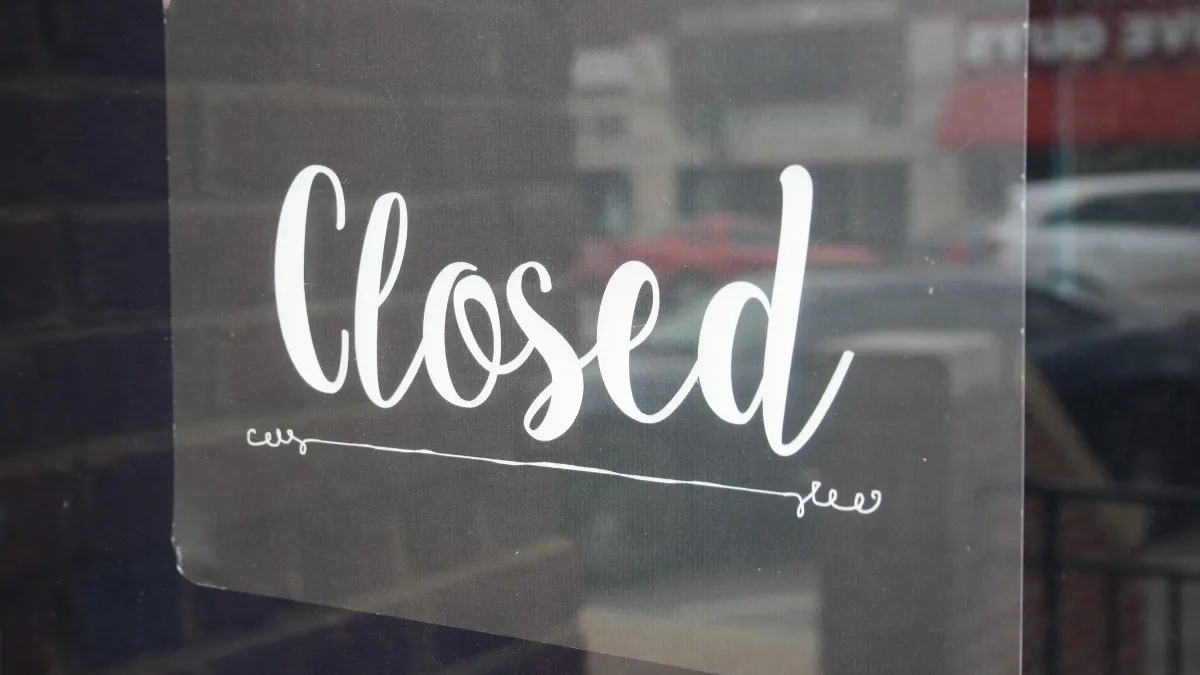Dive Brief:
- Sens. Marco Rubio, R-FL, and Susan Collins, R-ME, introduced two proposals to extend the Paycheck Protection Program (PPP) at least through the end of the year, Bloomberg said.
- Black-owned small businesses are closing at nearly twice the rate of small businesses overall, the Federal Reserve Bank of New York found in a study published Tuesday. Data show a 41% drop in active Black-owned small businesses between February and April, compared with a 22% decline overall. Meanwhile, the number of active Latin business owners fell 32%, while Asian business owners declined 26% and white business owners, 17%.
- Elsewhere, 31% of laid-off or furloughed workers who were reinstated on payroll report being laid off a second time, according to a Cornell University survey released Tuesday. Another 26% report being told by their employer they may be laid off again.
Dive Insight:
The PPP’s loan application window closes Saturday unless Congress intervenes. The Rubio-Collins proposals come about a week after Senate Republicans suggested a long-term loan initiative that would earmark almost $60 billion for seasonal businesses and companies based in low-income communities. That plan would additionally recirculate the nearly $130 billion in PPP funds that remain unclaimed.
One proposal would extend PPP through Dec. 31, with a special focus on businesses with 300 or fewer employees that have seen a 35% decline in revenue or more, according to Bloomberg. It would also fund personal protective equipment for employees.
A second plan would create a longer-term program to extend loans to hard-hit businesses, and give an extra $10 million to the Minority Business Development Agency.
The latter would at least make an effort to address an ongoing racial disparity that the New York Fed study is backing up. The central bank branch looked at Census Bureau data and found that counties where Black-owned businesses are highly concentrated saw a higher number of COVID-19 cases per 1,000 residents through the end of June.
"Areas with higher concentrations of Black businesses are more likely to be facing larger direct (longer forced closures, COVID-19 symptoms) and indirect (social distancing, fewer customers) effects of the pandemic," the report said.
About 40% of receipts from Black-owned businesses are concentrated in 30 counties, the New York Fed found. Nineteen of those 30 counties are areas with the highest COVID-19 concentration.
"The important metapoint is that you can’t take geography out of it," Claire Kramer Mills, an assistant vice president at the New York Fed, told The Wall Street Journal. "There are particular places that have been dually hard hit. They’ve been hard hit from a health perspective, and they’ve been hard hit from a business perspective. They’re also hit by not being served optimally by one of the largest federal programs in our lives."
Nonwhite-owned businesses have long reported being underserved by PPP. Only 12% of Black and Latino business owners who applied for PPP loans reported receiving what they asked for, according to a May survey the Global Strategy Group conducted on behalf of Color of Change and UnidosUS, two equal rights organizations.
The New York Fed study cites weaker ties to financial institutions as a potential reason for PPP inequality.
The Cornell survey, meanwhile, illustrates another hurdle PPP recipients face. Bonnie Morales, co-owner of Kachka, a Russian restaurant in Portland, Oregon, said she may have to lay off up to half of her current workforce if the $500,000 PPP loan she received runs out.
The loan, which allowed her to hire back most of her 48 employees, "is like a Band-Aid on top of a Band-Aid — it’s barely holding on," she told Bloomberg. "It’s going to fall right off in October."
Giving businesses second PPP loan would be "a lifeline," Patti Husic, president and CEO of Harrisburg, Penn.-based Centric Financial, told American Banker.
One proposal lawmakers introduced last week would let companies with up to 300 employees and at least a 50% drop in revenue get a second PPP loan of as much as $2 million.
But that’s not the only tweak some in the banking space are suggesting beyond a mere extension of the program from Congress. Paul Merski, group executive vice president for congressional relations and strategy at the Independent Community Bankers of America, said he is concerned a move to cut origination fees from 5% to 3% on second PPP loans would mean demand for the funds would continue to stagnate.
"The terms just barely worked in the first round of PPP with the origination fees, interest rate and things like that," he told American Banker. "I don’t see a robust take-up of additional PPP lending if the terms for both the borrower and lender get worse."
Others are seeking further simplifications to loan forgiveness applications.












